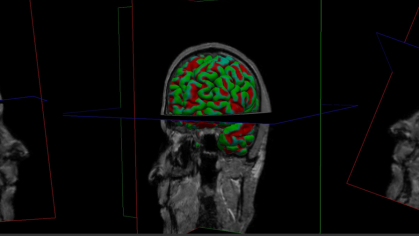The primary mission of the Cancer Prevention and Outcomes Data Support (CPODS) SR is to support participant recruitment, data collection, and management of diverse research projects, including surveys, observational studies, randomized controlled trials, implementation science and cancer care delivery research, program evaluation, and qualitative research studies
Find a Core Facility
Core facilities play an integral role in our research infrastructure, empowering researchers to break new ground by offering specialized laboratories with state-of-the-art equipment, unique instrumentation and shared services managed by scientists with the technical expertise and experience to help others.
There are two types of Rutgers research core facilities. Centrally-managed core facilities are managed by the Office for Research and Locally-managed core facilities are managed by local units include schools, centers, or institutes. Centrally-managed core facilities are indicated in red text below the facility name.
Filter
-
Key Resources Consultation, Education, and Training; Participant Recruitment and Tracking; Project Management; Survey Data Collection and Management; Qualitative Data Collection, Management, and AnalysisLocation New Brunswick/PiscatawayContact Name Elisa V. Bandera, MD, PhDContact Email elisa.bandera@rutgers.edu
-
The facility provide advanced microscope systems for optical imaging of live and fixed samples It has two scanning Confocal systems, all attached to inverted microscopes. Each of these systems has unique imaging capabilities beyond those of the traditional confocal microscope, but samples must be prepared on sealed slides, chamber slides or chamber/dish with coverslip bottom.
Key Resources Confocal microscopy; optical imaging; imaging; pathology servicesLocation NewarkContact Name Luke FritzkyContact Email fritzklf@njms.rutgers.edu -

The Center provides state of the art human magnetic resonance imaging with a research dedicated 3T scanner. The facility was created by the Brain Health Institute in order to further clinical neuroscience efforts at Rutgers. The Center aims to facilitate high quality neuroscience research aimed at understanding brain -behavior relationships in both health and disease.
Key Resources- Magnetic Resonance Imaging with and without staff support (Reservation of magnet/control room time)
- Contrast injection for MRI (including nurse support)
- Technical support (programming and analysis)
- Neuroradiological evaluation of scans
- Mock scanner (reservation of time)
Location New Brunswick/PiscatawayContact Name David H. ZaldContact Email david.zald@rutgers.edu -
The CAPR facility is equipped with state-of-the-art proteomics instruments and bioinformatics systems for protein structure and function analysis.
Key Resources Mass spectrometry; protein identification and characterization; protein mixture quantitation; liquid chromatography; HPLCLocation NewarkContact Name Hong LiContact Email liho2@njms.rutgers.edu -
The Clinical and Research Data Warehouse (CRDW) at Rutgers is a secure, HIPAA-compliant central repository that includes diverse healthcare data and essential analytical tools for gaining insights into medical conditions, outcomes, and treatments.
Key Resources Access to comprehensive clinical data; enhanced research capabilities through robust data analytics tools; efficient data management; collaborative opportunities.Location Other -
Rutgers comprehensive program of animal care includes protocol review, a duly-constituted animal care committee, occupational health and laboratory safety, and full-time veterinary care. Our animal care facilities are USDA-registered and accredited by AAALACi, an association widely recognized for its standards of excellence in laboratory animal care and has an Animal Welfare Assurance with the US Public Health Service (PHS), a requirement for conducting any PHS/NIH-funded animal work. Animal Care works closely with the Institutional Animal Care and Use Committees (IACUC) to provide the highest quality animal care and veterinary oversight of our research animals in support of this commitment to humane animal research.
Key Resources- Veterinarian Services Assist research staff with development of new animal models and protocols; Ensure appropriate surgical and postsurgical care is provided; Provide instruction and advice regarding handling and restraint, anesthetic and analgesic drug selection; Health monitoring which includes disease prevention and regular surveillance; Diagnosis, treatment and resolution for sick animals
- Veterinary Technical Services Anesthesia support; Breeding and weaning; Animal identification – ear tag, ear notch, tattoo, microchip; Tissue collection for genotyping; Sample collection – blood, urine, other tissues; Dosing; Medical treatments; Drug and supplies ordering; Euthanasia; Training on animal handling, procedures, anesthesia, aseptic surgical techniques, and other as required; Surgical Services
- Husbandry Services Cage changing and cage washing; Providing water and food to animals; Cleaning and maintenance of animal rooms, equipment and facilities; Receiving animal shipments and transferring animals to cages to their rooms
Location OtherContact Name Jeetendra EswarakaContact Email je352@research.rutgers.edu -
Confocal microscopy permits one to optically section a fluorescent sample (such as a cell that has been stained with contrasting fluorescent dyes) with superior resolution by using a pinhole to reject light that originates outside of the chosen area. By collecting a series of such images through the depth of a sample, the user may assemble a highly accurate three-dimensional reconstruction of the entire sample.
The SP8 TCS confocal microscope allows users to make proper and detailed observations of fast biological processes. The benefits of super-resolution, high-speed imaging, and the capability to image multiple fluorescent markers simultaneously. With the use of LIGHTNING, users can trace the dynamics of multiple molecules, even those expressed at low levels, simultaneously over long recording times in living specimens. Quantitative imaging methods such as Fluorescence Recovery After Photobleaching (FRAP) are available. The facility maintains workstations with software packages for image processing.
Key Resources Leica SP8 TCS SMD with an Argon laser, Fluorescence correlation spectroscopy (FCS), Lightning Resolution, Single Molecule Detection(SMD), and FRAP capabilities; Leica SP8 TCS with LAS-X software packageLocation CamdenContact Name Melanie LopezContact Email ml1246@camden.rutgers.edu
